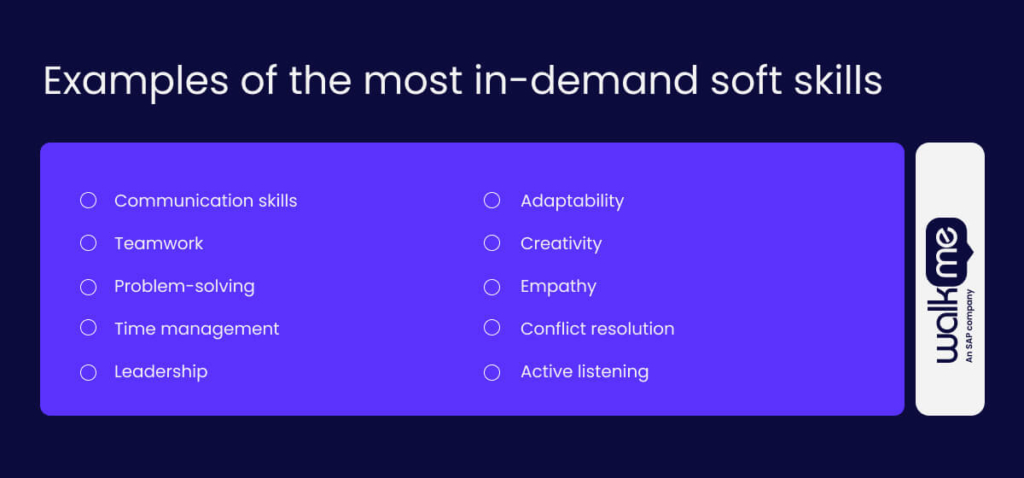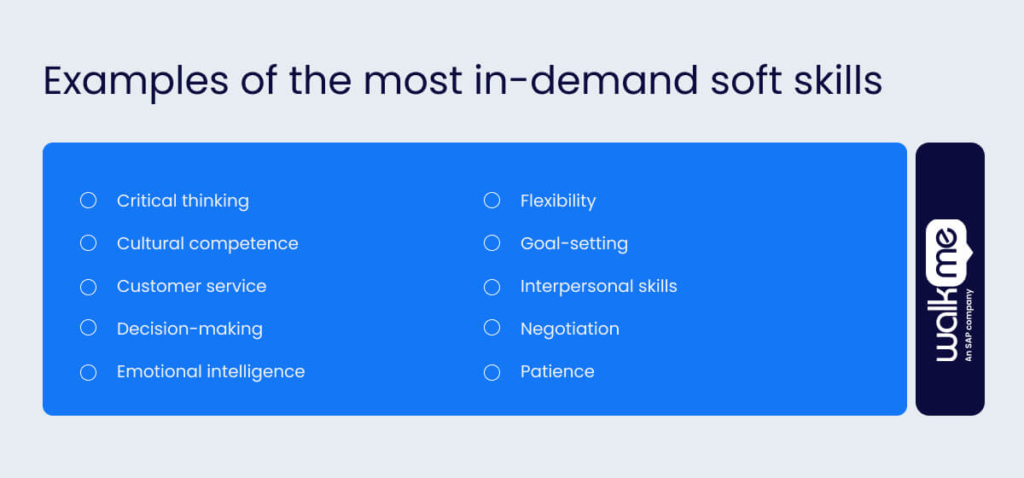Soft skills are the interpersonal abilities that help people communicate, collaborate, and navigate challenges in the workplace.
They include traits like empathy, adaptability, and problem-solving—skills that enhance relationships and teamwork.
The New York Post emphasizes that employers now place a high value on soft skills such as communication, teamwork, adaptability, and problem-solving. This culture change shows how soft skills have shifted from being optional to essential.
If technical skills get you hired, soft skills ensure you thrive and encapsulate your ability to grow, lead, and succeed.
This article will explore the 20 most in-demand soft skills. We’ll provide an overview of each and discuss how they can be developed, why they matter, and how they contribute to both individual success and organizational development.
Let’s explore the top 20 most in-demand soft skills:

- Communication skills
Clear communication is the foundation of workplace success. It goes beyond speaking or writing, ensuring your message is understood, listened to, and tailored to different audiences. Strong communicators build trust, prevent misunderstandings, and bolster collaboration.
To develop this skill, seek feedback on your clarity, practice active listening, and refine your ability to adapt to varying contexts. In modern workplaces where remote and cross-functional teams are common, practical communication ensures ideas flow seamlessly, strengthening both individual and organizational performance.
- Teamwork
Teamwork is the art of working collaboratively to achieve shared goals. It requires mutual respect, team dynamics, and balancing personal accountability with group needs. Successful team players contribute their strengths while supporting others.
Developing teamwork skills involves practicing active listening, learning to resolve conflicts constructively, and embracing diverse perspectives. Strong teamwork boosts innovation, accelerates problem-solving, and drives organizational success through collective effort.
- Problem-solving
Problem-solving is the ability to break down complex issues and find effective solutions. It’s about staying calm under pressure, analyzing information, and thinking creatively to overcome obstacles. This skill isn’t just for crisis moments and should be used and improved upon throughout the employee journey.
Workplaces thrive on people who approach problems with confidence and clarity. Regularly practicing decision-making, seeking feedback, and learning from mistakes are ways to refine this valuable skill.
- Time management
Time management means making conscious choices about how you allocate your hours. It goes beyond fitting tasks into your day to ensure that each task aligns with your priorities. Whether juggling multiple projects or managing your energy levels, time management techniques are about staying intentional.
To improve, start by identifying what tasks really matter and eliminate distractions. Use simple tools like time blocks or prioritization frameworks. Mastering this skill boosts both your productivity and your peace of mind.
- Leadership
Leadership is the ability to guide and inspire others toward a common goal. Leaders should set an example, offer guidance, and empower others. It’s the ability to motivate a team, not through force but through trust and respect.
Strong leaders listen more than they speak, recognize their team’s strengths, and adapt their approach when needed. It’s about taking responsibility and owning both successes and setbacks. Leadership shapes culture, and when done right, it drives people to achieve more than they thought possible.
- Adaptability
Adaptability means staying flexible when things don’t go as planned. It’s about adjusting to new challenges and unexpected changes with a positive attitude. Adaptability isn’t optional in workplaces where business practices evolve quickly.
You can develop this skill by staying open to feedback, being willing to learn new things, and embracing uncertainty. Adaptability helps you stay effective when things shift, making you an invaluable asset to your team. When you’re truly adaptable, you’re not just reacting to change but thriving in it.
- Creativity
Creativity is the spark that turns challenges into opportunities. It’s about looking at problems from angles others might miss and finding unique ways to solve them. Rather than following a set path, creative individuals ask questions, experiment, and embrace the unknown.
To expand your creativity, try stepping out of your routine, engaging with different fields, exploring new hobbies, and exposing yourself to diverse perspectives. When you bring creativity to your work, you solve problems and open doors to innovation and growth for both yourself and your organization.
- Empathy
Empathy is understanding and sharing the feelings of others. It’s about connecting on a deeper level and responding thoughtfully to their emotions. This skill helps resolve conflicts, strengthens relationships, and helps employees navigate the lack of trust in business.
To expand empathetic leadership, practice active listening, ask questions that invite others to share their perspectives, and pay attention to non-verbal cues. Understanding your colleagues’ experiences creates a supportive environment where collaboration thrives, and everyone feels respected and valued.
- Conflict resolution
Conflict resolution is finding ways to address disagreements or tensions before they escalate. In a professional setting, this means recognizing the root of the issue and helping everyone involved find common ground. Developing this skill means staying calm under pressure, using clear communication, and looking for solutions that benefit all parties.
Strong conflict resolution maintains a positive atmosphere, keeps team dynamics intact, and prevents small issues from affecting productivity. This skill ensures a smoother, more cooperative workplace where challenges are handled efficiently and without resentment.
- Active listening
Active listening goes beyond hearing words and involves fully understanding the speaker’s message verbally and non-verbally. To strengthen this skill, focus on the speaker, ask questions for clarity, and avoid interrupting. Remember to respond thoughtfully, showing you value their perspective.
When practiced well, active listening helps build trust, reduces misunderstandings, and improves collaboration. In a team environment, it ensures everyone feels heard, leading to better problem-solving and stronger relationships. This skill is essential for open communication and driving meaningful connections.

- Critical thinking
Critical thinking involves examining situations, analyzing facts, and making well-informed decisions. To sharpen this skill, challenge assumptions, consider different perspectives, and evaluate evidence before drawing conclusions. It’s an essential tool for problem-solving, as it helps you navigate complex issues with clarity.
When decisions must be made quickly, critical thinking ensures you’re thoughtfully responding. It’s key to avoiding mistakes, improving decision-making processes, and driving innovative solutions. Cultivating this skill boosts personal confidence and contributes to better decision-making within teams.
- Cultural competence
Cultural competence means understanding, respecting, and interacting effectively with people from diverse backgrounds. This skill is essential for creating inclusive environments where everyone feels valued. You can build cultural competence by engaging with different cultures, learning about diverse perspectives, and reflecting on your own biases. The ability to navigate cultural differences helps drive collaboration and minimizes misunderstandings.
When you embrace diverse viewpoints, you bring fresh ideas and enhance team performance. In a globalized work environment, cultural competence becomes a cornerstone of effective communication and mutual respect.
- Customer service
Every business values customer service, but those who go the extra mile truly make a difference. Excellent customer service means addressing needs, resolving issues, and creating a positive experience at every touchpoint. It requires patience, empathy, and quick problem-solving.
Building strong customer support skills comes from actively listening, staying calm under pressure, and striving to exceed expectations. Employees who deliver exceptional service build customer loyalty and improve the company’s reputation. Going above and beyond ensures long-term relationships and contributes to a thriving business you actively feel a part of.
- Decision-making
Decision-making traditionally has been the realm of leaders, but now it’s a skill everyone must embrace. Strong decision-making can significantly impact outcomes, whether choosing priorities, solving problems, or weighing options. Analyzing situations, anticipating potential risks, and choosing the most effective action are all key decision-making traits.
To formulate skills in this area, practice gathering data, seeking diverse perspectives, and trusting your judgment. Effective decision-makers drive success by making informed, confident choices helping teams move forward with clarity and purpose. Their actions lead to improved efficiency and alignment across an organization.
- Emotional intelligence
Emotional intelligence has moved beyond just being “in touch” with feelings. It’s a critical tool for building strong connections, navigating stressful situations, and influencing positive outcomes. Individuals with high emotional intelligence can read the room, recognize emotional cues, and respond thoughtfully.
Developing this skill involves self-reflection, being open to feedback, and learning to manage your emotions and others’. Those who excel at it create more cohesive teams, boost morale, and improve collaboration. It’s a key asset for creating a supportive, productive environment where people feel valued and understood.
- Flexibility
Flexibility is a game-changer in a world where nothing stays the same for long. It’s more than rolling with the punches—stepping up when things change unexpectedly and finding a way to move forward. Those who master flexibility embrace uncertainty and turn challenges into opportunities.
True flexibility lies in knowing how to juggle multiple tasks, adjust priorities on the fly, and stay focused when plans shift. This organizational agility makes them invaluable to any team, ensuring that individual performance and team goals remain on track despite disruptions. Keep in mind that flexibility drives success in fast-moving environments.
- Goal-setting
Setting goals involves defining clear objectives that give direction and purpose to your efforts. It’s a process of identifying and breaking your priorities into actionable steps. Effective goal-setting provides a roadmap that helps you stay on track and measure progress.
Whether personal or professional, goals act as milestones, keeping you motivated and focused on what truly matters. When practiced consistently, goal-setting drives achievement and encourages a sense of accountability, positively impacting individual performance and team success.
- Interpersonal skills
Interpersonal skills allow you to build and maintain positive relationships with others. They include communicating effectively, collaborating, and understanding social dynamics. Whether interacting with coworkers or clients, these skills enable you to connect with people on a deeper level, fostering trust and cooperation.
Cultivating interpersonal skills requires self-awareness, empathy, and an understanding of different perspectives. In the workplace, they play a critical role in creating a harmonious environment and driving collaboration, ultimately contributing to stronger team dynamics and organizational success.
- Negotiation
Every business thrives on effective negotiation, but the best negotiators know it’s not just about striking deals. It’s about creating win-win situations where everyone leaves satisfied. Negotiation is a delicate balance of persuasion, understanding needs, and knowing when to compromise.
Developing this skill means learning to manage emotions, read body language, and build rapport quickly. Strong negotiators drive business success by cultivating long-term relationships and securing favorable outcomes that benefit individuals and teams. The ability to negotiate successfully can lead to greater opportunities and stronger partnerships.
- Patience
Many overlook patience, a key trait vital for navigating challenges smoothly. It’s the ability to remain calm under pressure, make thoughtful decisions, and maintain composure during difficult situations. Developing patience involves practicing mindfulness and learning how to control impulses.
In the workplace, this skill helps you manage stress, prevent rash decisions, and build trust with others. Patience encourages long-term thinking, helping individuals and organizations focus on the bigger picture and achieve sustainable success. When you exercise patience, you open the door to better problem-solving and stronger collaboration.
Mastering soft skills for success
In the evolving workplace, soft skills are indispensable. Unlike hard skills, which are measurable and technical, soft skills are nurtured over time and require continuous refinement.
Communication, adaptability, and empathy are vital for building strong connections, solving problems, and driving team success. They don’t stay fixed and grow through experience and self-reflection.
Regularly assessing these skills is crucial to keep improving. If you’re struggling, it’s essential to have a candid conversation with a mentor or manager. This helps pinpoint areas for growth and ensures you stay on track.
Ultimately, investing in soft skills is the best thing you can do for your own development because it gives you the instruments to navigate challenges confidently.
If that’s not enough of a takeaway, soft skills also empower us to leverage our internal strengths, which in turn enhances our ability to develop and apply critical employee skills effectively in real-world situations.

